Minimising the cost of departure
As more UK residents explore the prospect of relocating abroad, particularly to attractive European destinations such as Portugal, there is increasing awareness of the financial implications of expatriation.
By Portugal team
This article is published on: 6th August 2025

As more UK residents explore the prospect of relocating abroad, particularly to attractive European destinations such as Portugal, there is increasing awareness of the financial implications of expatriation.
While the UK does not impose a formal “exit tax” on individuals leaving or moving assets out (pensions being an exception), there are costs on departure in the form of the loss of certain reliefs and exemptions. Understanding these nuances and early planning is critical to minimise any costs and maximise the planning opportunities.
This article focuses on British individuals relocating to Portugal under its standard tax residency rules as the new tax incentive IFICI regime offers separate incentives and planning complexities.
So what do you need to be aware of when leaving the UK?
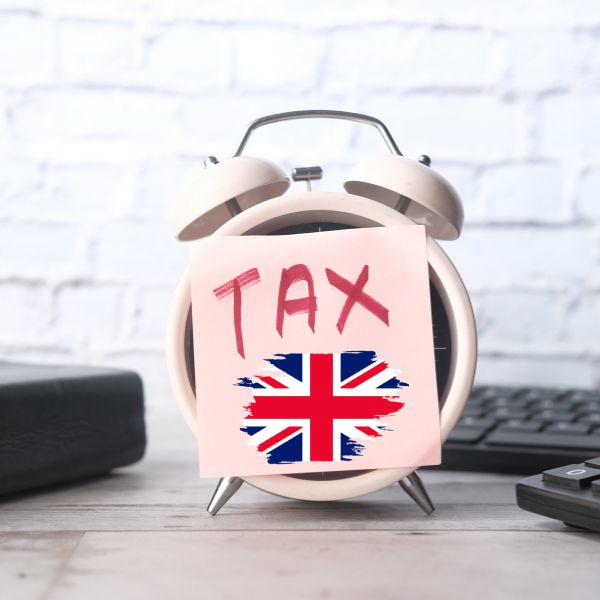
The foremost consideration is ensuring that you do not inadvertently fall back into the UK tax system. This can happen simply by spending too many days in the UK. Depending on individual circumstances and the number of ties you maintain with the UK, this allowance may be as few as 16 days or as many as 182 days per tax year.
To give you the certainty of knowing where you tax obligations arise, it is important that you understand the day count allowance that applies to you and your family (based on the UK’s Statutory Residence Test) and keep detailed records of time spent in the UK and abroad.
Private Residence Relief (PRR)
UK residents can generally sell their main home without incurring capital gains tax due to PRR. However, once tax residency shifts to Portugal, this exemption no longer applies.
Portugal taxes gains on property sales regardless of whether the property is a main residence. Therefore, the timing of property disposals becomes crucial and could have a significant tax impact.
Business Asset Disposal Relief (BADR)
Formerly known as Entrepreneurs’ Relief, BADR allows UK residents to sell qualifying business assets at a reduced capital gains tax rate of 14%. However, this relief is not available once you become tax resident in Portugal as it is residence of the shareholder that determines the tax treatment, not the location of the business.
Under the UK-Portugal double taxation treaty, Portugal has taxing rights over such gains, where the rates start at 28%. Nevertheless, with appropriate structuring, these gains can be reduced—and in certain cases, eliminated entirely.
Pension Commencement Lump Sum
The so-called “25% tax-free cash” is a UK tax incentive and other countries, including Portugal, do not recognise the concept of this allowance. As a result, any amount withdrawn would be taxed as income in Portugal.

Historically, prudent planning would be to retain as much as possible within pension schemes as they are not (currently) subject to inheritance tax. However, two major developments have affected this planning:
1. Inheritance Tax (IHT) on Pensions: From April 2027, UK pension schemes will fall within the scope of UK IHT.
2. Residency-Based UK IHT: From April 2025, UK IHT will be assessed based on residency. Individuals who have been non-UK tax residents for 10 out of the previous 20 years will escape UK IHT—except for UK situs assets, including pension schemes left in the UK after April 2027.
As a result of the erosion of the tax benefits of pensions, more and more are looking to deplete their pension schemes, particularly if they hold Non-Habitual Resident status in Portugal.
Overseas Pension Transfer Charge
This point is slightly different to the others discussed above, as it doesn’t apply when the individual leaves the UK, rather it is when the pension scheme leaves the UK.
Since October 2024, transferring a UK pension to a Qualifying Recognised Overseas Pension Scheme (QROPS) may incur a 25% tax charge.
Whilst this will stop the majority of pension transfers taking place, some have decided to accept the 25% exit tax charge in order to save their beneficiaries from the 40% IHT charge to be implemented from April 2027, as discussed above.
Pension Contributions After Departure
UK tax relief on pension contributions is only available to UK residents. However, former residents may contribute up to £3,600 gross annually for up to five tax years post-departure.
EIS and SEIS Reliefs
Tax advantages associated with the Enterprise Investment Scheme (EIS) and Seed Enterprise Investment Scheme (SEIS) are similarly lost upon changing tax residence. Furthermore, if an EIS/SEIS holder ceases UK residency within the three-year qualifying period, gains previously deferred may trigger an immediate tax liability.

• Company residency risks: A sole director managing a UK company from Portugal could render the company Portuguese tax resident, triggering double taxation.
• Permanent establishment issues: Continued business activity from Portugal could create a “permanent establishment,” bringing local corporate tax exposure.
• Temporary Non-Resident Rule: Under this anti-avoidance rule, those returning to the UK within five years of departure may face tax on capital gains and income realised during their non-resident period.
The Prospect of a UK Wealth Tax
Recent discussions have reignited debate over the potential introduction of a wealth tax in the UK. While no formal proposals have been tabled, policymakers and think tanks are increasingly considering wealth taxation as a mechanism to address fiscal imbalances and fund public services.
Should such a tax be introduced, it could significantly alter the financial planning calculus for high-net-worth individuals contemplating emigration. Although the UK has historically avoided a net wealth tax, a shift in political direction could see assets—particularly those held in the UK—subject to new assessments.
This development, coupled with changes to inheritance tax and pension treatment, is leading many to explore pre-emptive planning, including asset restructuring, offshore trusts, and in some cases, accelerated departures. For those considering relocation to jurisdictions like Portugal, which offers comparatively benign treatment of foreign income and gains, the window to act may narrow.
In the current environment, tax-efficient emigration from the UK is not as simple as buying a one-way ticket. The erosion of traditional tax reliefs, the complexity of cross-border rules, and the looming spectre of wealth taxation, demand early and strategic planning. Whether mitigating capital gains, managing pensions, or avoiding permanent establishment risks, proactive advice is essential.
As always, individuals should seek bespoke advice based on their circumstances and monitor regulatory developments closely—both in the UK and Portugal.
By Matthew Green
This article is published on: 5th August 2025
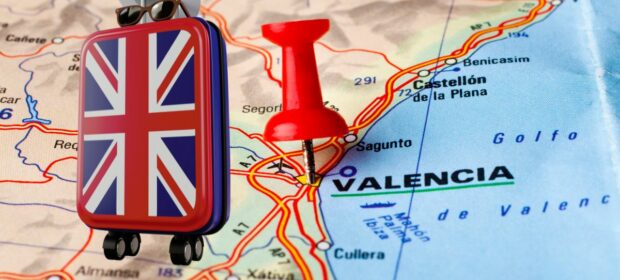

When Richard and Anne relocated from the UK to Spain’s sunny Valencia region to enjoy their retirement, they brought €100,000 in savings. They weren’t looking for high returns — just a safe place to grow their nest egg and potentially draw a small income if needed.
Richard chose to keep the money in a Spanish bank account. It felt safe, accessible, and earned a seemingly decent 5% per year. But what he didn’t realise was how Spain’s tax system was quietly eroding his returns — and how his family could face significant complications if he passed away.
Each year, Richard earned 5% interest. However, Spain taxed those annual gains at 26%, meaning he was only compounding on what was left after tax.
(Note: While 5% is well above typical long-term interest rates, this figure is used to highlight the negative impact of tax on compounding.)
Effective annual growth: Just 3.7% (after tax)
Value after 20 years: €202,269
What it cost him: Thousands in lost growth potential
What looked like a safe, straightforward approach turned out to be far less efficient than it could have been.
A friend introduced Richard to a financial adviser, who explained the numerous benefits of Spanish tax-compliant bonds — fully legal investment vehicles often underused by expats. These structures allow investments to grow tax-free until funds are withdrawn.
Richard invested the same €100,000 into a compliant bond, again earning 5% annually. But unlike the bank account, no tax was deducted each year, allowing the full amount to compound uninterrupted.
After 20 years:
Bond value: €265,330
Tax due on gain (€165,330): €42,986
Net amount after tax: €222,344 — €20,075 more than the bank account
Compound Growth Comparison (No Withdrawals)
The graph shows how the tax-compliant bond (orange dashed line) outperforms the bank account (solid line) over time, thanks to tax deferral. Even after paying tax at the end, the bond delivers a much higher return.

Suppose Richard withdrew €5,000 annually to help cover living expenses. Here’s what happened:
From the bank account:
Withdrawals were fully taxed each year, and interest was also taxed annually. The account balance declined steadily, and the effects of compounding were weakened.
From the tax-compliant bond:
Withdrawals triggered tax only on the gains within each €5,000. The rest, drawn from his original capital, was untaxed or lightly taxed. Meanwhile, the remaining funds continued to grow tax-free.
Growth Comparison with Withdrawals
Even with yearly withdrawals, the bond preserved capital efficiently and delivered stronger long-term growth compared to a taxed bank account.

One of the most overlooked parts of financial planning in Spain is inheritance tax and transfer of wealth to beneficiaries.
Because we take a holistic approach, we’d ensure Richard’s bond was correctly structured so that:
What if he’d kept the money in the bank?
His heirs would have faced a slow, costly probate process in Spain, potential succession taxes, and possibly long delays — all during an already emotional time.

If you’re an expat living in the Valencia region, with savings in Spanish or foreign bank accounts, you may be unknowingly exposed to:
By moving your savings into a Spanish tax-compliant bond, you could:
✓ Maximize long-term growth through tax deferral
✓ Withdraw income more efficiently
✓ Avoid Spanish probate
✓ Protect your family from unnecessary taxes
I help expats across the Valencia region make their money work smarter within Spanish tax rules — always with a view to your entire financial picture, including what happens after you’re gone.
By Matthew Green
This article is published on: 2nd August 2025

Meet the Johnsons—David, Sarah, and their two children. Five years ago, they moved from the United States to Valencia, seeking a slower pace of life and the Mediterranean lifestyle. They assumed managing their finances abroad would be straightforward. With healthy savings and US-based pensions, what could go wrong?
Quite a bit, as it turned out.
They quickly discovered that managing finances abroad wasn’t just about currency exchange or opening a local bank account. As US citizens, they still had to comply with complex IRS reporting rules—rules they didn’t fully understand. After several failed attempts to find the right financial adviser, they realised they needed expert help.

When they first arrived in Spain, David and Sarah were confident.
David had worked as an engineer, Sarah in finance.
They’d spent years building their nest egg. But early optimism gave way to confusion as the financial realities of expat life set in.
1. US Investments and Pensions
They held retirement accounts in the US—401(k)s, IRAs, and a share portfolio in a brokerage account. These accounts were in good shape, but they couldn’t find anyone in Spain who understood how to manage them in light of their new residency.
2. Currency Exchange Issues
Their income and savings were in dollars, but their daily expenses were in euros. Each transfer to their Spanish account brought unpredictable exchange rates, affecting their monthly budget.
3. IRS Reporting Headaches
They knew they still had to report their global income to the IRS, but the process was far from clear. Forms like the FBAR (Foreign Bank Account Report) and Form 8938 (for foreign financial assets) came with serious consequences for mistakes—but no one could give them reliable guidance.

After a year of frustration, the Johnsons were introduced to Matt Green, a financial adviser with The Spectrum IFA Group, who specialises in helping expats in Spain.
A Comprehensive Understanding of US-Based Assets
With access to SEC authorised investment experts, Matt arranged a review all of their US accounts—401(k)s, IRAs, and investments—and explained how they could be managed efficiently from Spain. He helped them:
Clarity on US Tax Reporting
One of the Johnsons’ biggest challenges was compliance with US tax laws. Matt walked them through:
Matt’s guidance replaced confusion with confidence. The Johnsons finally understood their obligations and had a plan to stay fully compliant.
Creating a Reliable Income Stream
The Johnsons wanted a stable monthly income. Matt advised them on converting their retirement assets into a predictable, tax-efficient income stream. He structured a drawdown strategy that:
Estate Planning Made Simple
The Johnsons also wanted to protect their children’s inheritance. With their sons still living in the US, they worried about how cross-border laws might affect their estate. Matt provided guidance on:

Thanks to Matt’s help, the Johnsons no longer feel overwhelmed.
Instead, they have a clear, tailored financial plan… and a trusted adviser by their side.
1. Clarity and Confidence
They now understand exactly how their investments work in both countries. Their monthly income is reliable, their savings are structured efficiently, and currency worries are gone.
2. IRS Compliance Without the Stress
Tax return season used to bring anxiety. Now, with Matt’s support, they’re on top of all IRS requirements. FBAR, Form 8938, and FATCA are no longer mysteries—they’re just part of an organised financial routine.
3. A Future They Can Enjoy
With their finances in order, the Johnsons are enjoying the life they envisioned—traveling, spending time with family, and making the most of their time in Spain without the cloud of financial uncertainty.
The Johnsons’ story is one of many. Managing US-based assets, navigating foreign tax laws, and ensuring compliance with IRS rules can be overwhelming for American expats.
That’s where Matt Green and The Spectrum IFA Group come in. Their expertise and network of professional contacts bridge the gap between US and Spanish financial systems, giving expats the confidence to manage their wealth effectively, stay compliant, and plan for the future.
From investment strategy to tax reporting and estate planning, Matt’s holistic approach ensures that you can enjoy your life abroad—without worrying about what’s happening back home.

Are you a US citizen living in Spain and unsure how to manage your finances across borders?
Contact Matt Green at The Spectrum IFA Group for a free consultation. Whether you’re struggling with IRS reporting, retirement planning, or protecting your family’s legacy, Matt can help you turn financial confusion into clarity—just like he did for the Johnsons.
By Matthew Green
This article is published on: 31st July 2025

New Country, New Challenges
Meet John, a British expatriate who moved to sunny Valencia five years ago to enjoy a relaxed retirement on the Spanish coast. While his new life brought exciting experiences and opportunities, John soon realised that managing finances in a foreign country was more complex than he had anticipated.
Back in the UK, John had a firm grasp of his financial situation. But once in Spain, the rules changed – international taxes, currency exchange, and estate planning added unexpected layers of complication. That’s when John understood the value of having local, professional financial guidance.

At first, John felt secure in his retirement. He had a pension, savings, and years of experience managing his finances.
But living abroad came with hidden obstacles:

After hearing positive feedback from fellow expats, John sought help. That’s when he met Matt Green from The Spectrum IFA Group—a specialist in helping expatriates manage their finances in Spain.
From their first meeting, John felt at ease. Matt listened carefully to his concerns, goals, and vision for the future. What followed was a personalised, strategic plan to bring John financial clarity and peace of mind.
Tailored Financial Planning
Rather than offering one-size-fits-all advice, Matt conducted a full review of John’s financial situation—both in the UK and Spain. He then crafted a plan tailored to John’s needs, covering income, taxes, and long-term goals.
Creating a Reliable Monthly Income
One of John’s top priorities was ensuring a stable monthly income despite currency volatility. Matt proposed a tax-efficient income drawdown strategy that converted John’s savings into a predictable monthly income—while minimising taxes and avoiding unnecessary risk.
Optimizing Taxes
Matt helped John take full advantage of the UK–Spain tax treaty, structuring his pension withdrawals in a way that reduced his tax burden in Spain.
Planning for His Family’s Future
John wanted his two sons in the UK to inherit without complications. With Matt’s guidance, he learned how Spanish inheritance laws worked and how to structure his estate accordingly. Together, they used tools such as locally compliant investment bonds and beneficiary nominations to ensure a seamless transfer of wealth.
The result? A comprehensive succession plan that reflected John’s wishes while protecting his sons from legal hassles and unexpected taxes.

With Matt’s ongoing guidance, John now enjoys financial stability and confidence.
Conclusion: The Power of Professional Advice
John’s story shows the true value of working with a financial adviser—especially as an expat. Matt Green didn’t just help John manage his money; he gave him confidence, clarity, and security.
What sets Matt apart is his holistic approach. He combines deep expertise in international finance and tax with access to a network of specialists when needed, ensuring that every angle of your financial life is covered.
If you’re living in Valencia—or anywhere in Spain—and want to secure a reliable income while protecting your family’s future, partnering with an expert like Matt can make all the difference.

Ready to take control of your financial future?
Whether it’s creating a tax-efficient income, navigating international tax rules, or planning your estate – Matt Green at The Spectrum IFA Group is here to help.
Contact Matt today to schedule a free consultation and begin your journey to financial peace of mind – just like John did.
By Portugal team
This article is published on: 23rd July 2025

Here is what you need to know
If you are approaching the end of your 10-year Non-Habitual Residence (NHR) status in Portugal, it is important to understand the financial transition ahead.
Without careful planning, you could face significantly higher tax liabilities but with careful planning and maybe some strategic financial adjustments, you can protect your wealth and future lifestyle.
Why NHR has been so attractive?
Portugal’s NHR regime offers a valuable 10-year window of tax advantages. Under this status:
It is a powerful incentive for expatriates relocating to Portugal but one with a clear expiry date.
What NHR does not cover
NHR is not a blanket exemption for everything:
The cost of doing nothing
Once your NHR period ends, you will be subject to Portugal’s standard tax rules:
Without pre-emptive action, these changes could substantially erode your investment returns and retirement income.

Planning options before and after NHR
With considered planning you can mitigate the impact of the end of NHR:
Even if your NHR has already expired, or if you are a standard resident, planning is key to improving your tax position and ultimately, the money in your pocket. The first step is to look at what you have and where it is based. Can you change how you hold your assets or move them into another jurisdiction?
Structuring for tax efficiency
Whilst the prospect of paying up to 48% on income (excluding solidarity taxes) and 28% capital gains tax is unpleasant, it is possible to rearrange your finances over time to reduce this tax burden.
Final Thoughts
Effective, early planning makes all the difference. Whether your NHR is nearing expiry, or you have already transitioned to standard residency, reviewing your assets, their location and tax treatment is crucial — and the sooner you act, the more options you will have.
By Portugal team
This article is published on: 21st July 2025

We are often asked how to become a Portuguese tax resident, but of equal importance is understanding how to exit the UK tax system cleanly and efficiently, and this is governed by the UK Statutory Residence Test (SRT).
Introduced in 2013, the legislation sets limits on how much time you can spend in the UK without triggering UK tax obligations and it is relevant in two main ways:
1. Capping time in the UK to avoid falling into the UK tax net for income and capital gains tax.
2. Determining UK Inheritance Tax (IHT) liability, especially following changes announced in the October 2024 UK Budget i.e. a move away from domicile to a residency based test.
Interaction with NHR / IFICI
Limiting your time in the UK is particularly important if you wish to take advantage of the reduced tax regimes such as Non-Habitual Residence (NHR) or the new IFICI regime in Portugal, as you must be tax resident in Portugal to benefit.
For example, if you are taking large lump sums from a pension under NHR, you want to ensure you are tax resident in Portugal to benefit from the 0% or 10% rate. If you trigger UK residency rules, then you could discover that your pension income is instead taxable in the UK at 20%, 40% or 45% in the UK.
The complexity of tax residency
Becoming a tax resident in Portugal whilst simultaneously leaving the UK tax net behind can be complex due to several factors:
• The UK tax year runs from 6 April to 5 April, whereas Portugal’s tax year aligns with the calendar year (1 January to 31 December).
• UK tax residency can be triggered by spending as few as 16 days in the UK, depending on your ties, while Portugal generally applies a 183-day rule.
• UK tax residency is assessed on a fiscal year basis, whereas Portugal assesses tax residency over a rolling 12-month period.
It is important to review your tax residency every year as it can change from year to year depending on where you have spent your time.
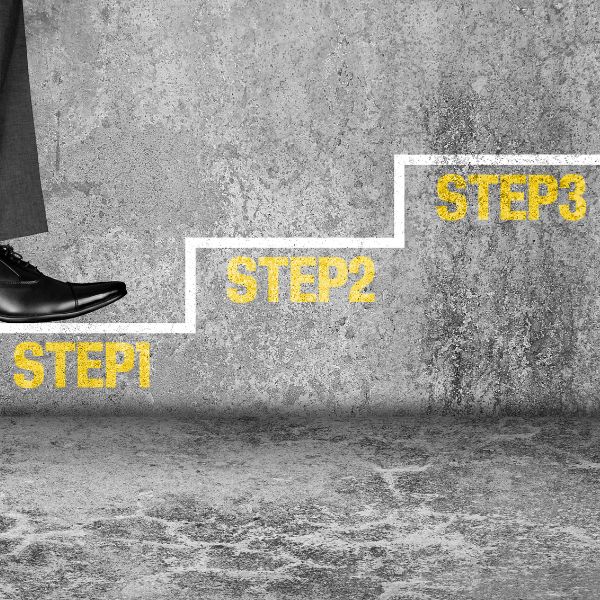
The SRT – Three tests within a test
The Statutory Residence Test (SRT) consists of three sub-tests that must be applied in order:
The rules and definitions around these tests are detailed in hundreds of pages of UK legislation and are beyond the scope of an article, but we find most individuals do not meet the criteria for the first two tests and therefore fall into the Sufficient Ties Test.
The Sufficient Ties test means that the more ties and connections you have to the UK, the less time you can spend there before triggering UK tax residency. Ties in this context include (but are not limited to) available accommodation, work, minor children or a spouse/civil partner in the UK.
The result is that everyone is given a day allowance which can be between 16 and 182 days – this is contrary to the popular belief that there is a standard 90-day allowance. Each person is assessed individually under the test meaning married couples can have different day account allowances.
0% Inheritance Tax and the SRT?
From 6 April 2025, the UK will replace the concept of domicile with a residence-based system for inheritance tax purposes, and this is assessed using the SRT.
Individuals who have been non-UK resident for at least 10 out of the last 20 years at the time of death, will only be subject to UK IHT on their UK situ assets e.g. property, investments, pensions (from 2027) and cash left with institutions in the UK. Any assets held overseas will be IHT exempt exposing a very advantageous opportunity to mitigate or remove a UK IHT liability by moving assets outside of the UK.

…But how will the tax man know?
Some believe it is difficult for HMRC to track their time, but there are two important points to consider:
1. If you are challenged the burden of proof lies with you, not HMRC. Additionally, you will be dead, so it is up to your executors to try and prove where you were resident in the last 20 years.
2. HMRC’s ‘Connect’ system uses data from various sources, including banks, the UK Border Agency, flight records, the Land Registry, online platforms and even social media, to identify potential tax evasion.
The advice is therefore to keep an accurate record of times spent in each jurisdiction to which you are linked, ensuring you are limiting your time to the appropriate day allowance.
Additional points to consider
UK source income
Certain UK-derived income, such as rental income and civil service pensions, remain taxable in the UK regardless of your residency status.
Five-year anti-avoidance rule
If you leave the UK and become non-resident, you must remain non-resident for more than five full tax years to avoid UK tax on certain income or gains realised during your absence. Otherwise, these may be taxed upon your return to the UK.
Clarifying definitions
Be aware that terms like “accommodation” and “home,” or “work” and “employment,” have different definitions in UK and Portuguese tax contexts. If you are considered resident in both countries, tie-breaker clauses in the UK-Portugal Double Taxation Agreement will determine your tax residency, and these clauses differ from the Sufficient Ties Test used in the SRT.
In conclusion, navigating UK departure and Portuguese entry correctly is essential to avoid unnecessary taxation and compliance issues. While the SRT may appear straightforward, the details are intricate—particularly under the new IHT rules, so professional and personalised advice should always be sought.
By Matthew Green
This article is published on: 19th July 2025

Have you ever hesitated over a property purchase due to the long-term commitment of taking on a mortgage? What if your investments could do the heavy lifting for you?
Let’s take a simple example. Imagine you want to buy a property valued at €400,000 but would prefer not to use your cash savings for the purchase. With a 30% deposit, you secure a mortgage of €280,000 over 20 years at a fixed interest rate of 3.5%. This results in monthly repayments of approximately €1,206.
You then invest a lump sum of €450,000 into a tax-efficient, Spanish compliant investment bond. Assuming an average long-term annual return of 5%, the investment could generate €22,500 in gross income per year.
After taxes, and recognising the tax-efficiency of the Spanish compliant bond, this income is sufficient to cover the monthly mortgage payments. This strategy allows you to keep your capital invested, potentially growing over time, while the income pays the mortgage. Essentially, your investments are working for you—generating returns that fund your property purchase without depleting your savings.

Moreover, using investments in this way can be part of a broader wealth planning strategy.
Some investment bonds offer valuable estate planning advantages, allowing for seamless transfer to beneficiaries, often with no or low tax exposure.
Of course, investment returns are not guaranteed, and it’s essential to regularly review your portfolio to ensure it aligns with your goals and risk tolerance.
Working with an experienced financial adviser can help structure the right investment and drawdown strategy.
Using an investment to pay your mortgage isn’t just possible— with careful planning it can be a workable solution for preserving capital, generating income, and building long-term financial security, all while enjoying your new home.
By Susan Worthington
This article is published on: 13th July 2025
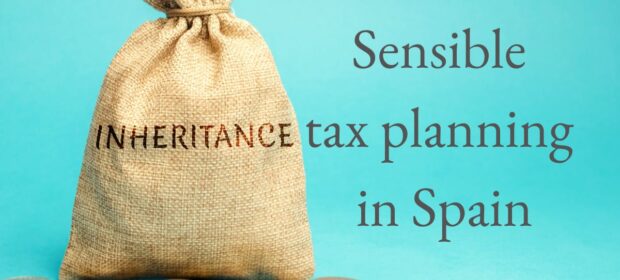
Effective Estate Planning for British Expatriates in the Balearic Islands: A Brief Guide
Estate planning is a critical consideration for British expatriates living in the Balearic Islands. With assets potentially spread across the UK and Spain, and legal frameworks differing between jurisdictions, effective planning ensures that your wealth is passed on efficiently and according to your wishes. Here are the key points to consider:
Planning ahead is essential to safeguard your estate and reduce the likelihood of disputes or unnecessary tax liabilities. British expats in Spain often have assets in both countries, so your plan should address how these will be managed and distributed. Consideration should be given to residence status, the location of assets, and whether your heirs live in the UK, Spain, or elsewhere.
Wills. To streamline the probate process and ensure clarity in both jurisdictions, dual wills can be highly beneficial. This means having one will to cover your UK assets and another for your Spanish holdings. These wills must be carefully drafted to avoid legal conflicts or revocation—coordination between legal professionals in both countries is vital. A Spanish will must comply with local formalities and should reference the UK will, and vice versa.
Assets such as pensions, life insurance policies, and investment accounts may pass outside of a will, depending on the beneficiary nominations made. It’s crucial to regularly review and update these to ensure they align with your broader estate plan. Failing to do so can lead to unintended outcomes, especially if personal circumstances (like marriage or divorce) change.
Spanish Succession Law Spain operates a system of forced heirship, where a significant portion of an estate must go to specific relatives (typically children). However, EU Regulation 650/2012 (Brussels IV) allows foreign nationals residing in Spain to opt for the succession law of their country of nationality. This election must be clearly stated in your Spanish will. Without it, Spanish law may apply by default, potentially overriding your intentions.
UK Inheritance Tax (IHT) Even if you are a long-term resident of Spain, and recognising the recent favourable changes to UK inheritance tax (IHT) rules for many expatriates, you may still face IHT on both UK and non-UK based assets. Careful planning can ensure this exposure is removed entirely. At the same time, Spanish succession tax may also apply based on the location of assets or the residency of beneficiaries. This creates a risk of double taxation. However, tax treaties and relief provisions mitigate these liabilities if utilised effectively.
Solutions. There are several tools and strategies that can enhance estate planning efficiency, including the use of trusts, life insurance policies for tax mitigation, and gifting strategies. Spanish-compliant investment bonds, for instance, may provide tax deferral benefits and simplify succession. The suitability of these solutions depends on personal circumstances and goals.
Professional Advice. Given the complexity of cross-border estate planning, expert guidance is not just helpful—it’s essential. A qualified financial adviser and a solicitor familiar with both UK and Spanish succession laws can ensure your plan is both compliant and effective. Coordinated advice prevents legal conflicts and optimises outcomes for your heirs.
In summary, British expatriates in the Balearics must take a proactive, coordinated approach to estate planning. By understanding the interplay between UK and Spanish law and seeking tailored advice, you can protect your legacy and ensure your wishes are respected.
By Gareth Horsfall
This article is published on: 3rd July 2025

Pensions, detractions, deductions and more……
I should start this E-zine with an apology that it has taken so long for me to write another one. I would never have left it this long normally, but what with recent global events and the threat of some kind of new world war, I almost felt a bit paralysed with what to write as it all seemed a bit irrelevant.
Thankfully, at least for now, we seem to be over the possibility of global armageddon so whilst we all have some breathing space, I thought I would just put some more financial planning thoughts and experiences down on an E-zine.

But before I start, I am sure you are all eager to know what I have been up to with the new home / land. Well, as many of you already know, spring time brings power to grass! It was quite something to see it grow quite so quickly. Sun and rain, until the start of June, gave it some kind of super power. However, I decided not to try and win the battle because as most people told me I would never win this one, and it would not be long before it all started to dry out with the heat of the summer (which it has now started to do) and besides that it is good for the wildlife
In the end I decided to work with it and mowed ‘sentieri’ into the long grass to allow the birds, butterflies and insects to continue to enjoy their natural habitat. I read that this is a good thing to do for the health of the land, fruit etc and actually it looks quite nice as well. Apart from a few locals who have told me that I need to cut the grass back to the floor because snakes hide in it (which kind of seems an interesting point, because I don’t really want to meet any vipers and if they have somewhere to hide and get away without me noticing them then we should both be happy) others have commented on the nice effect of being able to walk amongst the grass and see the insect life going about its daily business. Not only, but its been fun watching the various flowers that have been popping up at different times. It almost feels like they have been drawing straws. One variety seems to have its moment, then dies back and the next one appears and so on, until I guess at some point it will be so hot and dry that even they will have had enough, but still there are flowers appearing in the shady areas. This all sounds very Laura Ashley and my next step will be to buy a long flowery dress, wide straw hat and wicker basket to collect the fruit! However, land management is interesting and somethng new for me and apart from the grass I have spent time doing the fruit ‘raccolta’ and making jams with the help of my kitchen aid ‘Bimby’! Apricot, Prune, Mulberry, and cherry jams to date. Still got figs, apples and pears to go. I will keep you posted.
Other than that any kind of land clearance and tidying up has come to a stand still because it is just far too hot and so I will have to wait until the autumn to start my early morning (before I start work) workouts on the land…..and then there is the oil as well! Busy busy busy!
But, moving on from my travails, of which many of you share, I wanted to just go through a few clarifications in this Ezine which have come about due to recent discussions with clients and people contacting me and asking questions. I also wanted to share info on the tax deductions and detractions that you/we can take advantage of in Italy to help reduce our taxable burden. As it has been observed many times, unlike many countries which offer non-taxable income allowances (US and UK as examples), Italy does not. Therefore we pay tax from Euro number 1. However, Italy does also have a system of deductions and detractions which can be used to offset against income to try and reduce the tax burden. If I am being honest I can’t say that they are as good as a non-taxable allowance in terms of their effect on income, but they can be help. Lastly, I have posted some short videos on investment themes with the collaboration of one of our investment partners, Chris Saunders at New Horizon Asset Management. A way to get ideas out quickly and easily.
Initially I wanted to touch on the subject of UK pension payments.
UK state pension.
I am not sure why but a number of you have contacted me this year to say that your commercialista is now saying that you need to declare your UK state pension on your Italian tax return and pay tax on it. This is, of course, very correct and makes me question why some commercialisti are only now waking up to this fact. It always worries me when I get a surge of the same enquiry. My concern is for those people who have been legitimately taking advice from well meaning professionals who have not been doing the right thing and will now start to file in the correct way. This could mean that the Agenzia delle Entrate will be alerted to the fact and may come asking for back payments, fines and penalties. If this is the case then they have 5 years to do so, and they have a sneaky habit of doing so about 4 years and a few months after the filing.
If you find yourself in such a situation then please remember that your commercialista has to carry insurance in the event of them mis-advising you. As long as you have the proof that they did so (which may be the hardest thing to prove because often they just provided verbal confirmation that something did not need declaring) then you can ask them to carry any costs incurred by you as a result of an error on their part. The hard part is proving it and then having that discussion with them. Check those historical emails discussions!!!
Sign the P85 with HMRC
On a similar note I recently met 2 people in the same Umbrian comune who had received a letter from the AdE which stated that they were no longer able to apply for the double taxation credit for tax paid in the UK on their UK personal / occupational pension payments. Now, this might sound like a contravention of the double taxation treaty, but as the AdE stated in their letter (which I managed to gain sight of), the correct action is that when someone leaves the UK with a pension in payment, they must apply to HMRC for gross income payments by applying through the P85 system on the HMRC website. Failure to do so means that the AdE is not obliged to offer any tax credit for tax paid in the UK and instead can charge full Italian tax. This means that you could pay in Italy and the UK until such time as you have received a gross payment authorisation from the UK: Back payments can be claimed from HMRC (where tax credits have not been awarded already) by completing the P85 form but these can take time.
In my experience, over the last 15 years, Umbria and Tuscany have always been at the leading edge of tax legislation and implementing it to the letter of the law so its not beyond imagination that this may spread out across Italy. However, there are instances in Abruzzo and Marche as well. Therefore, if you are the holder of a UK pension, are still paying tax in the UK and claiming that back through the credito d’imposta option every year, it would be advisable to apply for UK gross pension payments via the P85 claim form on the HMRC website, before the AdE refuses you the option and you end up paying twice. https://www.gov.uk/tax-right-retire-abroad-return-to-uk
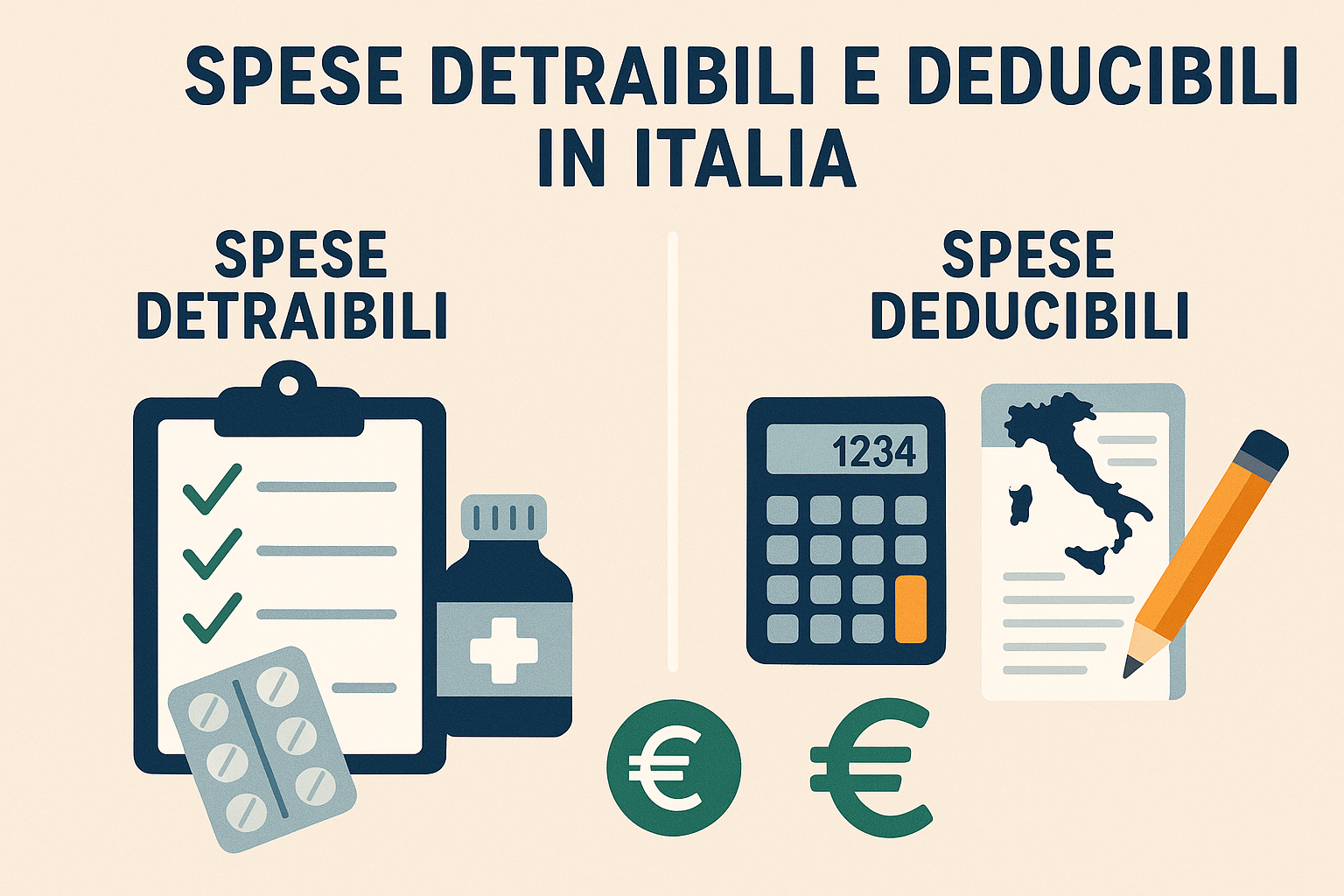
So, moving on from pensions, lets take a look at tax deductible and detractable expenditure in Italy. Annoying, as they are due to the adminisitrative issues involved, they can reduce taxable income so are worth looking into..
Firstly, it might help to know the difference between a tax deduction and a detractable expense.
Both are valuable, and knowing the difference helps you understand how the savings work.
Without a doubt the most common category is healthcare expenses ( detractable at 19%)
What you can claim is as follows:
There is a franchigia related to these expenses, which means that it is only the accumulated expenses over €129.11 which are considered eligible. If your total health expenses are below this amount then you cannot detract from tax. (You cannot claim this credit if the expense is covered by insurance)
To give an example……if my total expenses are €800 during the year, then the calculation is €800 – €129,11 = €670,89, on which I apply the 19% tax credit = €127,47 tax credit.
This example may not seem much but a few years ago I had to have some urgent dental care which cost €10,000. It was not covered by insurance and so I had to pay myself. That year I had a tax credit of €1875,46. Every little helps.
So, for all those trips to the farmacia make sure you present your codice fiscale to the pharamcist and they will normally tell you whether it is an item that qualifies or not.
** FARMACIA AND HEALTH EXPENSES ARE NOW REGISTERED AUTOMATICALLY ON THE AGENZIA DELLE ENETRATE WEBSITE (YOU CAN ACCESS THE WEBSITE AND CHECK THEM YOURSELF) HOWEVER THERE ARE OCCASIONS WHEN THEY DON’T APPEAR SO MAKE SURE YOU KEEP YOUR RECEIPTS AND GIVE THEM TO YOUR COMMERCIALISTA / FISCALISTA WHEN YOU FILE YOUR RETURNS **
This is by far and away the next biggest category for gaining tax credits. I know myself because in 2024 we spent alot of our savings on the new home and this year we will be applying for almost all of these bonuses as tax credits.
The key incentives for home improvements are as follows:
On your ‘Prima Casa’ you can claim a 50% tax credit up to a maximum spend of €96000, spread over 10 years.
On your second home or property (other than Prima Casa) it is a 36% on a maxi psend of €96000 spread over 10 years.
(excluding boilers which burn fossil fuels, such as caldaia gas)
This is a category which people often fail to utilise because there are some questions over whether foreign insurance premiums paid can be deducted in an Italian tax return.
The policies which qualify are Life insurance, accident ( both max €530) and long-term care insurance (LTC) – (€1291)
They must qualify ( even if issued outside Italy) under the following conditions:
I myself still insist on entering my life policies issued in the UK years ago, before Brexit, and which cover me throughout the EU and were issued whilst the UK was still in the EU. I principally have life insurance contracts with Legal and General and they provide cover across the EU. The other alternative is to take out Italian equivalent policies especially for things like health insurance. It’s worth getting a quote from one of the bigger insurance providers such as Generali (or Genertel, their online offering) Allianz, Zurich, Groupama, Unipol Sai, Banca Intesa, Reale etc
Other categories include:
Donations (19-30%)
donations to recognised NGO’s, religious institutions or universities.
Mortgage interest (19%)
You can deduct interest on mortgages for your first home (prima casa) up to a cap of €4,000 per year.
Education expenses (19%)
Max annual deduction for private schools may vary by level and region, with a cap around €800 per child.
If you rent your main home, you may claim a tax credit based on your income and contract type.
For example: Ordinary rental contracts (contratto 4+4), Student housing and transfers for work (if you’ve moved for employment reasons)
The credit varies depending on income, age, and contract type (e.g., up to €495.80 or more).
Family related deductions and credits
Dependent children and other family members, alimony and maintenance payments (deductible), Nursery/kindergarten costs (detraction up to €632 per child)
Disabled persons (LEGGE 104/1992 BENEFITS)
Special deductions and detractions for people with disabilities or their caregivers, including: 19% for adapted vehicles (with limits), full deduction of medical devices, assistance costs, etc.
Sport and Youth activities (19%)
Up to €210 per child under 18 for gym, swimming, dance classes, etc. Applies to recognized sports facilities and clubs.

You may or may not have noticed by now that the effects of war often have very little effect on financial markets, in fact we could even argue that they actually have a slight positive effect in the main, where the wars are contained in their various regions of the world.
(I will refrain from any personal thoughts on this because there is a human element here which is indescribable).
A month or so ago I decided with one of our investment management partners, Chris Saunders at New Horizon Asset management, to do some trial question and answer short videos which I thought might be a good way to quickly get some investment manager thought out into the internet-sphere and from which you/we could all benefit from. Our initial video was on the possibility of a tariff on European goods, imposed by the USA, and which is a topic which is still on the table and so I will share it here.
The second was a video on the Iran / Israel escalations which have, for the meantime, now subsided but which included some historical information from Chris about the duration of war and effect on financial markets in general. Quite interesting if you are akin to listening.
I feel like these are still relevant given that we don’t know yet where things are going. If you find them useful then please let me know, I would welcome the feedback. They are meant to be quick fire short videos which we can get out to you and on social media to react to events, rather than waiting to write about it on an Ezine which takes time and by the time that I can get round to it Pres. Trump has already changed his mind another 50 times. It’s proving to be a challenging year to keep on top of the political minefield. Thankfully as we have seen from the markets dull reaction to recent events, the politics is largely treated as short term noise and so we can focus our minds on our long-term personal financial planning instead.
If you are interested in the questions and answer short videos then click on the links below.
If you would like to discuss these or any other tax or financial planning related issues for your life in Italy then please don’t hesitate to contact me on gareth.horsfall@spectrum-ifa.comor call / message on +39 3336492356
Always happy to help where I can!
If you want to know more about me or the things I do then just click here.
By Barry Davys
This article is published on: 30th June 2025

It is all about the planning, solutions, implementation and continuing support (PSIC).
We take as long as is necessary to understand your situation and listen to your hopes and plans for the future. It is time well spent because to be effective for you, we work to understand first, which then guides the process for your planning. In fact it governs how you and your adviser approach each step in our PSIC process..
How did our mortgage broker source a mortgage for a High Net Worth person who had become a tax resident in Spain wanted a mortgage as part of his strategic financial planning to improve his capital efficiency.”
Find out how here.
– 31 over €1M
– 13 over €2M
– 7 over €3M
– 3 over €4M
– 1 over €5M
– 1 over €6M
– 2 over €7M
– 1 over €8M
– 6 with Price by Request

If this is how you want your planning to be managed, book an initial call directly with Barry Davys, at a time that is convenient for you, using his online service. You will be offered the choice of a phone call or a video call when choosing your time.